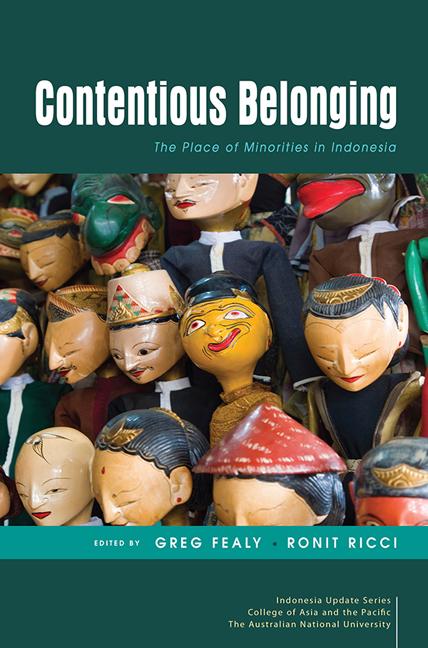Book contents
- Frontmatter
- Contents
- Tables and figures
- Contributors
- Acknowledgments
- Glossary
- Map
- 1 Diversity and its Discontents: an Overview of Minority–Majority Relations in Indonesia
- PART 1 HISTORY AND LAW
- PART 2 DISABILITY
- PART 3 SEXUALITY
- PART 4 RELIGION AND ETHNICITY
- 9 The Mobilisation of Intolerance and its Trajectories: Indonesian Muslims Views of Religious Minorities and Ethnic Chinese
- 10 Disputes Over Places of Worship in Indonesia: Evaluating the Role of the Interreligious Harmony Forum
- 11 Anti-Chinese Sentiment and the ‘Return’ of the Pribumi Discourse
- 12 Minority and Advantage: the Story of Sindhis in Indonesia
- 13 ‘Normalising’ the Orang Rimba: Between Mainstreaming, Marginalising and Respecting Indigenous Culture
- PART 5 REFLECTIONS
- Index
- Indonesia Update Series
10 - Disputes Over Places of Worship in Indonesia: Evaluating the Role of the Interreligious Harmony Forum
from PART 4 - RELIGION AND ETHNICITY
Published online by Cambridge University Press: 06 September 2019
- Frontmatter
- Contents
- Tables and figures
- Contributors
- Acknowledgments
- Glossary
- Map
- 1 Diversity and its Discontents: an Overview of Minority–Majority Relations in Indonesia
- PART 1 HISTORY AND LAW
- PART 2 DISABILITY
- PART 3 SEXUALITY
- PART 4 RELIGION AND ETHNICITY
- 9 The Mobilisation of Intolerance and its Trajectories: Indonesian Muslims Views of Religious Minorities and Ethnic Chinese
- 10 Disputes Over Places of Worship in Indonesia: Evaluating the Role of the Interreligious Harmony Forum
- 11 Anti-Chinese Sentiment and the ‘Return’ of the Pribumi Discourse
- 12 Minority and Advantage: the Story of Sindhis in Indonesia
- 13 ‘Normalising’ the Orang Rimba: Between Mainstreaming, Marginalising and Respecting Indigenous Culture
- PART 5 REFLECTIONS
- Index
- Indonesia Update Series
Summary
Disputes over places of worship (rumah ibadat) have become an increasingly common type of interreligious conflict in Indonesia in recent years, replacing the sectarian violence that racked areas such as Ambon (in Maluku) and Poso (in Central Sulawesi) during the early reformasi period (Panggabean, Alam and Ali-Fauzi 2010). Although conflict over sites of worship occurs mainly between Muslims and Christians, disputes within faith communities are also common, as when Sunni Muslim groups protested against the presence of Ahmadi mosques in West Java (Crouch 2014: 159). This type of conflict signifies the complexity of relationships between majority and minority religious groups in a plural and democratic Indonesia.
Statistics on disputes over places of worship can be found in the reports of institutions specialising in religious freedom, such as the Wahid Foundation (2017) and the Setara Institute (2018). Although these publications provide valuable data on violations of religious freedom, they seldom delve into how and why such incidents occur. In addition, their main focus is, understandably, on transgressions against religious freedom, such as attacks on houses of worship, rather than on incidents where religious tensions have been managed effectively and conflict has been avoided. Departing radically from these reports, Ali-Fauzi et al. (2012) investigated the factors that gave rise to complex cases involving church construction in the greater Jakarta region. They analysed the variety of influences in different cases, paying particular attention to why some were successfully resolved, resulting in the building of the church, whereas others led to protracted legal, political and sometimes physical conflicts, some of which still continue. Panggabean and Ali-Fauzi (2015), meanwhile, located disputes over places of worship in the context of religious freedom and the role of the state, particularly the police, in protecting the rights of religious minorities. Both of these publications emphasised the need to improve police effectiveness and increase the role of religious leaders and civil society organisations in supporting state agencies to maintain freedom of religion.
Building on these previous publications, in this chapter I will look specifically at the role played by the Interreligious Harmony Forum (Forum Kerukunan Umat Beragama, FKUB) in managing conflict. These forums were established by a joint regulation issued by the ministries of religious affairs and home affairs in 2006.
- Type
- Chapter
- Information
- Contentious BelongingThe Place of Minorities in Indonesia, pp. 175 - 193Publisher: ISEAS–Yusof Ishak InstitutePrint publication year: 2019

